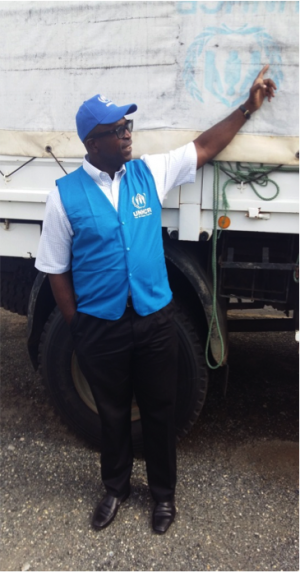Working with UNHCR to Help Refugees in Africa
Working with UNHCR to Help Refugees in Africa
 In May 2004, S-CAR MS student Kofi Goka, left Ghana to further his education in the U.S. He first attended Kutztown University in Pennsylvania and then Washington University in St. Louis, Missouri, where he obtained a Master’s of Arts in International Affairs degree. Kofi's course work at S-CAR, focuses primarily on conflict resolution and management, relating to violent extremism in West Africa.
In May 2004, S-CAR MS student Kofi Goka, left Ghana to further his education in the U.S. He first attended Kutztown University in Pennsylvania and then Washington University in St. Louis, Missouri, where he obtained a Master’s of Arts in International Affairs degree. Kofi's course work at S-CAR, focuses primarily on conflict resolution and management, relating to violent extremism in West Africa.
In his first year, Kofi worked as a network analyst and research assistant at the Terrorism Transnational Crime and Corruption Center at Mason, analyzing the illegal trade networks for rhino horns and identifying the transnational chains moving them from Africa to other places of the world. In addition Kofi worked as a volunteer at the Genocide Prevention in Africa Initiative (GPAI) at S-CAR.
Kofi is currently back in Ghana, interning at the United Nations High Commission For Refugees (UNHCR) field office in Accra, a position he found through the S-CAR Community Network and Forum. Under the UNHCR field office in Accra, Kofi works with the Durable Solutions Unit, which is tasked with the responsibility of finding long lasting solutions for the resettlement of refugees. The division focuses on three main areas, namely voluntary repatriation – where refugees decide to return to their country voluntarily; local integration – the integration of refugees into the local society; and resettlement – where refugees are relocated to another country. Kofi's primary task is to conduct research on national legislations and policies related to refugees and work with asylum seekers in urban areas to identify their specific protection needs. Kofi also helps with weekly counseling services for refugees and helps them pursue durable solutions to bring closure to their respective situations, a key objective for UNHCR in Africa in 2015.
Kofi's work also has a continental focus. He frequently coordinates with other UNHCR field offices in the region to gather data on best practices. For example, the regional comprehensive solutions strategy for the Democratic Republic of Congo refugee situation being implemented in the Central Africa and Great Lakes sub region, foresees the resettlement of at least 50,000 Congolese refugees between 2012 and 2017. This policy will be complemented by efforts to advocate for better protection and local integration opportunities through enhanced livelihoods and better access to social services for refugees. Where conditions for safe return are met, UNHCR will continue to support voluntary repatriation. In Tanzania, UNHCR will strengthen its support for the local integration of more than 162,000 Burundian refugees who have been living in the old settlements since 1972. In September 2014, the Government of Tanzania confirmed its decision to grant citizenship to these long-staying Burundians. UNHCR, together with other partners, will strive to assist their self-reliance and ensure access to basic services.
Conditions in the north of Mali remain generally insecure, unpredictable, and not yet conducive for the promotion of voluntary repatriation. However, UNHCR will continue to assist the spontaneous return of those willing to do so. UNHCR and the governments of Mali and Niger signed a tripartite agreement for the facilitation of voluntary return was signed in May 2014. It is expected that similar agreements will be concluded with the governments of Burkina Faso and Mauritania, where significant numbers of Malian refugees live.
The UNHCR field office is working together with the governments of Benin and Ghana to develop durable solutions for Togolese refugees. In 2016, the government of Benin issued residence permits for a 10-year period for refugees from Chad, the DRC, Rwanda, and Togo. Opportunities have also begun to emerge for Mauritanian refugees in Mali.
In addition, efforts to achieve local integration of Angolan, Liberian and Rwandan refugees will be pursued. In Zambia, the Government's pledge to locally integrate some 10,000 former Angolan refugees is being implemented. In the DRC, up to 18,000 former Angolan refugees will be assisted to integrate locally. In Namibia, after successful implementation of solutions for the majority of refugees, UNHCR will phase out its presence, while continuing to engage closely with the Government through the Regional Office in South Africa.
Kofi's experiences working with organizations in both Ghana and the U.S. have given him a unique global perspective. For him, all of these efforts should aim to provide a platform for discussions of concerns of governments and the refugee communities, rather than just encouraging repatriation. Kofi will return to the U.S. after this internship to finish his degree at Mason, but he would like to continue working with refugee communities all over the world afterwards.




